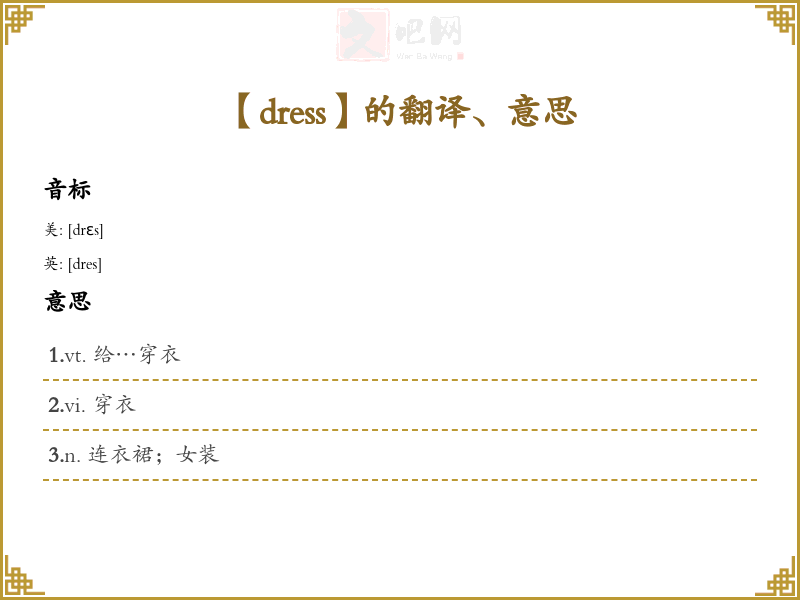【dress】的翻译、意思
时间: 2025-01-25 20:53:46
【dress】怎么读
美:[drɛs]
英:[dres]
【dress】是什么意思、字义解释
1. vt. 给…穿衣
2. vi. 穿衣
3. n. 连衣裙;女装
4. n. (Dress)人名;(法、德、西)德雷斯
【dress】的详细解释
英文单词学*与分析:[dress]
1. 基本定义
-
字面意思:
“Dress”指的是一种服装,通常是女性穿着的连衣裙。它的定义是“覆盖身体的衣物,通常有袖子和裙摆,通常用于正式或半正式场合”。 -
词性:
“Dress”可以作为名词(noun)和动词(verb)。- 名词:指特定类型的服装(例如“她穿了一条漂亮的裙子。”)。
- 动词:指穿衣或为某人穿衣(例如“他在为晚会打扮。”)。
2. 词源与起源
-
词源分析:
“Dress”源自古法语“drecier”,意为“穿衣、装饰”,其根源可以追溯到拉丁语“directiare”,意为“引导、安排”。这个词的演变体现了服装作为一种社会表达的功能。 -
历史背景:
“Dress”一词的首次记录可以追溯到中世纪的欧洲,那个时代,服装不仅是实用的物品,还显示了社会地位和身份。 -
课本:
- 在**的中学英语教材中,通常在初中阶段引入“dress”作为与服装相关的基本词汇。
- 在牛津和美国的教材中,通常在小学至初中阶段会提到“dress”,尤其在日常对话和时尚主题中。
3. 使用场景
-
正式与非正式语境:
- 正式:在商务会议或正式场合中,使用“dress”可以指代商务服装,例如“business dress”。
- 非正式:在日常交流中,可能会说“Let’s dress casually for the picnic.”(我们为野餐穿得随便点吧。)
-
特殊场合:
在婚礼、舞会等特殊场合,“dress”通常指特定的礼服,例如“wedding dress”(婚纱)和“evening dress”(晚礼服)。
4. 示例句子
-
She wore a beautiful red dress to the party.
她穿了一条漂亮的红裙子去参加聚会。 -
It is important to dress appropriately for a job interview.
在求职面试时,穿着得体是很重要的。 -
The bride looked stunning in her wedding dress.
新娘穿着婚纱时显得格外迷人。 -
He decided to dress casually for the weekend outing.
他决定周末出游时穿得随便些。 -
She spent hours choosing the perfect dress for the event.
她花了好几个小时挑选适合这个活动的完美裙子。
5. 同义词与反义词
-
同义词:
- Gown:指正式的长裙,通常用于正式场合。两者的区别在于“gown”更强调正式和优雅的设计。
- Attire:指整体的服装和装扮,包含“dress”的意义,但更为广泛。
-
反义词:
- Undress:意为脱去衣服,完全与“dress”的含义相反。
- Naked:指没有穿衣服,强调的是完全没有衣物的状态。
. 学方法
- 音标记忆法:
通过帮助记住“dress”的音标 /drɛs/,可联想为“dress”发音像“dress up”的“打扮”,有助于记忆其用法。
7. 关联词汇
- 常见的关联词汇包括:
- Dress code:着装规范
- Dressing room:更衣室
- Dresser:衣柜或化妆台
- Dressed up:打扮整齐
通过上述分析,可以更全面地理解“dress”这个词的含义、用法及其在不同场合中的重要性。
【dress】例句
1、[N-COUNT] A dress is a piece of clothing worn by a woman or girl. It covers her body and part of her legs. 连衣裙
例:She was wearing a black dress.她穿着一套黑色连衣裙。
2、[N-UNCOUNT] You can refer to clothes worn by men or women as dress. 服装
例:He wore formal evening dress.他穿了正式的晚礼服。
3、[V-T/V-I] When you dress or dress yourself, you put on clothes. 穿衣服
例:He told Sarah to wait while he dressed.他让莎拉等着他穿好衣服。
4、[V-T] If you dress someone, for example, a child, you put clothes on them. 给…穿衣
例:She bathed her and dressed her in clean clothes.她给她洗了澡并穿上干净衣服。
5、[V-I] If someone dresses in a particular way, they wear clothes of a particular style or colour. 打扮; 穿着
例:He dresses in a way that lets everyone know he's got authority.他着装的式样让每个人都知道他已掌有权力。
6、[V-I] If you dress for something, you put on special clothes for it. 穿礼服
例:We don't dress for dinner here.我们这儿参加晚宴不穿礼服。
7、[V-T] When someone dresses a wound, they clean it and cover it. 清理包扎 (伤口)
例:The poor child never cried or protested when I was dressing her wounds.在我为那个可怜的女孩清理包扎伤口时,她不哭不闹。
